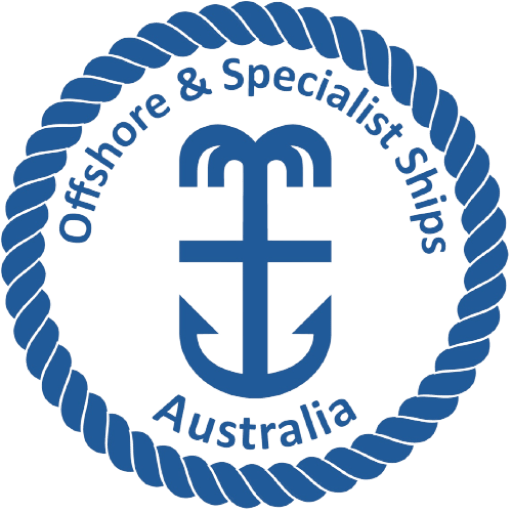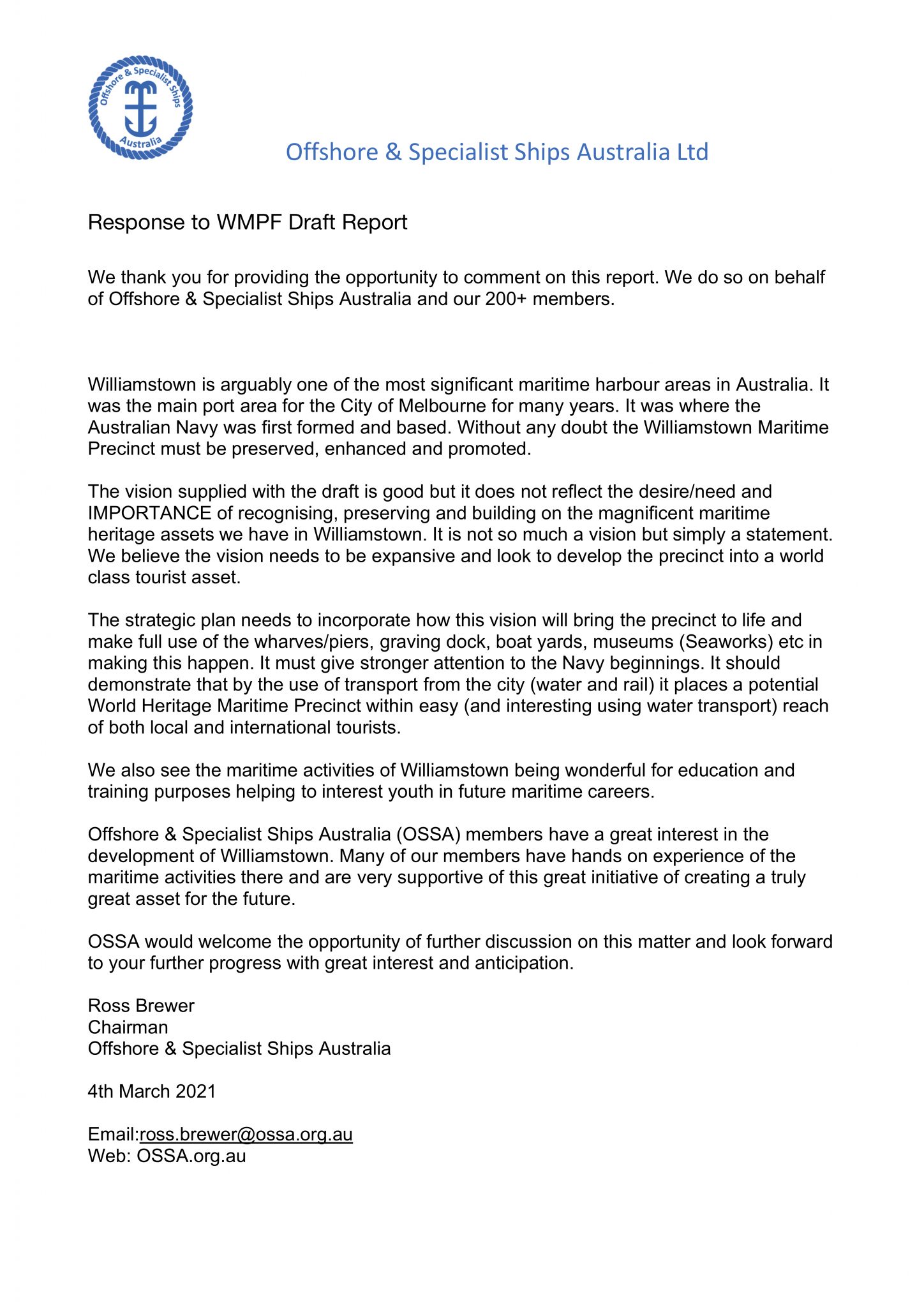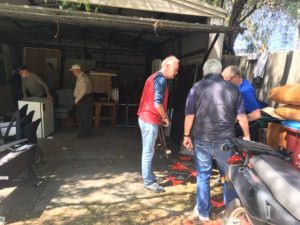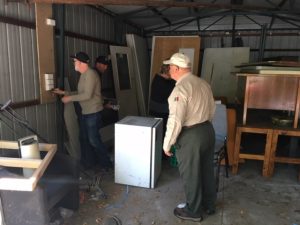Australia’s Maritime Logistics System
Thank you for the invitation to provide a submission for the above enquiry.
Offshore and Specialist Ships Australia (OSSA) was formed in 2017. Our organisation was formed to “promote the recognition of the Australian Maritime Industry”. We do this through recognising the heritage of the industry and the development of a school program supporting the career opportunities within the industry. Also visit our website: www.OSSA.org.au for further information about us.
Our Australian wide membership of some 250 members is drawn from the maritime industry with a large percentage still engaged in the industry. Over the past 20-30 years we have witnessed the demise of Australian shipping to its current perilous state leaving our national vulnerable to dependence on foreign interests. This must be remedied and we make the following observations and recommendations.
For an informed review to take place it needs to be understood that the seagoing component of “Australia’s maritime logistics system” has no Australian component to it at all. While this works very well during normal, healthy times of economic growth, production and co-operation it is also the point of immediate and comprehensive failure in times of prolonged crisis or conflict, leaving Australia completely exposed to the whim of foreign interests, both friend and foe.
Maritime Logistics Resilience
Resilience in the context of the maritime logistics system falls into four prime categories:
- Self reliance
- Disaster preparedness
- Critical Maritime skills shortage
- Security considerations, ie hostile acts impacting our maritime trade and or our capacity to supply critical resources to our armed services
Self reliance: Broadly speaking Australia’s general capability to move critical resources, supplies and materials for the purposes of her own economy. Currently Australian capacity to move a container, bulk cargoes, oil, foodstuffs, medical supplies, is zero and to our knowledge there are no international agreements of “treaties” ensuring that during a crisis Australia’s maritime lift requirements will be met. We must rely on the open market to secure foreign ships and crew. Example: Current ‘temporary legislation’ to allow foreign shipping to transport cargoes between Eastern and Western states due to flooding stopping inland road and rail transport.
Disaster preparedness: Maritime resources have a long history of being deployed to respond to natural disasters. Presently we rely elusively on the RAN to provide this as there is not merchant capacity to ask, even in the case where many types of merchant
vessel would be far more suitable and significantly cheaper to operate. Example: current relief to Tonga using HMAS Australia which was the only option.
Security considerations: Examples of this include the East Timor crisis of the late 1990s where Australian controlled merchant vessels provided critical support to the ADF running supplies and equipment in into Dili from Darwin due to there being no capacity in the RAN. A comprehensive risk assessment would also expose significant issues with this approach from a security perspective. Including but not limited to:
- Australian strategic fuel reserve being on the west coast of the USA, how is it proposed we access that during a crisis?
- Many chemicals from AD Blue to water treatment chemicals for our major cities being shipped from overseas plants on overseas ships
- Medical supplies mostly made overseas being transported here by overseas interests
- Iron Ore and other inputs into steel production from interstate currently being shipped to Port Kembla by foreign ships.
Critical Maritime skills shortage: The 2018 Maritime Skills Census conducted by MIAL (Maritime Industry Australis Ltd) showed a shortage approaching 600 officers and this figure has grown substantially since the survey. The July 2021 Seafarer Workforce Report from BIMCO and the International Chamber of Shipping highlights a current Global ships officer shortfall of 26,240 growing to 89,510 by 2026. This shortage in Australia has not only critically impacted our total logistics chain but has placed our nation in a dangerous area being dependent on foreign interests for the delivery of our entire sea transport needs. We are reliant on importing these skills which with Covid and the international shortage of officers will continue to severely disrupt our logistics chain.
From an Australia viewpoint the logistical impact of quarantine requirements for crews joining vessels from interstate or internationally has highlighted the strategic vulnerability for vessels of any class working in or trading to or from Australia. The interruption to Australia’s international supply chains is well documented.
Maritime Training:
Australia must do more to provide training opportunities to meet this challenge.
Industry feedback identified the following issues which must be addressed in order to increase training and to overcome predicted shortages.
The identified barriers to training were:
- -Government Inertia
- -Cost of training
- -Berth Access
- -Quality of Applicants
- -Ability to Mentor
Government Inertia:
The Government has not been supportive of Australian flag shipping and it is openly felt they actively support foreign flag ships and seafarers to the detriment of our own industry. This fear is primarily union related and has resulted in the vast reduction of the Australian fleet which in turn has created the reliance of overseas transport even for much of our coastal shipping requirements. Times have changed and government attitude must also. Maritime issues and secure sea transport in particular is essential for the well being of our nation. Government recognition and support must be raised and to effect this we highly recommend the appointment of a Minister for Shipping. This would provide the necessary senior involvement in both the commercial and strategic importance of the industry and would work to provide a framework for the future.
Cost:
The cost of training in the declining and depressed vessel markets in Australia is prohibitive under current training cost structures imposed upon vessel operators. By comparison some other maritime nations provide support for their maritime training by way of government subsidy for both living and course costs for young trainees. This support remains available through each level of certification. Also, pathways can evolve during training programs (Norway) to allow for choice of a deck or engineering career. The major portion of training costs in Australia is generally stipulated within the operators Collective Bargaining Agreements with the Officer Unions. Vessel operators historically carried the major cost of training for the broader industry including Pilot services, Stevedores, Port Authorities, Regulators, Training institutions, Oil and Gas majors, Tugs and others continuing along the maritime industry food chain. Retention of trained and competent seafarers has always been a huge problem for ship operators. Lucrative Pilotage, Towage and Shore based management positions are the major attraction for a shore-based career progression. There should be a system (and Fund) developed which would be based primarily on a user pays solution with an equitable arrangement for all industry users. Initially there will need to be some ongoing Federal government support to underpin such fund. The existing Collective Bargaining Agreement (CBA) provisions could be replaced by an industry standard scholarship and bursary arrangements. Trainee providers would have some certainty of projected enrolment numbers in the medium term further supporting Australia’s training establishments.
On the matter of direct employment cost it should also be noted that under several International Flag States and National fleets that seafarers wages are not subject to income tax or owner operators have all the income tax subsided by National Governments as long as they satisfy Flag certification and Nationality requirements. Australia did have a similar situation in place for seafarers sailing internationally and other expatriate workers under section 23AG of the Income Tax Act, which provided tax relief for contract periods more than 90 days (leave Inclusive). This part of the act was rescinded in July 2009. The act was not just specific to seafarers but allowed Australian owners with Australian officers to compete effectively in foreign markets. An export market could also be developed for Australian Seafaring Competencies should overseas employment benefit from favourable taxation treatment for engagements beyond Australian waters. It follows that many of the foreign national seafarers currently engaged in Australia may have a significant
competitive cost advantage by virtue of their National Collective Bargaining Agreements and / or wage subsidies. The discussion about foreign seafarers is in reality not about competency but about cost.
Quality of Applicants: Australia has a wonderful pool of eager school leavers seeking worthy careers and Professional Human Resources Departments can readily source good applicants. Well-targeted recruitment will lead to high retention when combined with well-structured trainee programs and mentoring. Unsolicited applications are received on a daily basis by most Ship Operators in Australia. Many of these applications display a passion for a seagoing career. Others demonstrate a liking for the earning potential and leave and not much more. Unfortunately, the Maritime Industry is not widely promoted within the wider community despite Australia’s economic development having been built on reliable trade by sea with the rest of the world. Few school leavers are aware of the availability of a career at sea and in the Maritime Industry generally with the variety of trades that exist ranging from RO RO vessels, General Cargo, Oil and Gas Operations, Antarctic Exploration to Scientific research, inshore and offshore towing and fisheries.
Knowledge of the industry tends to be the domain of seafaring families. Programs from OSSA Ltd (https://offshorespecialistships.com/school-program/) and Shipowners Associations can develop structured career information programs for schools around Australia. The awareness of professional opportunities ashore as one’s career evolves needs to also be promoted. These include but are not limited to:
- Management roles with owner operators.
- Port authorities.
- Stevedoring.
- Government Regulators.
- Classification Societies such as Lloyds, DNV etc.
- Oil and Gas companies involved in offshore exploration and production.
- Offshore wind farming.
- Shippers and Ships Agency.
- Fisheries and Aquaculture
- Pilotage.
Once qualified, wages and conditions are very competitive compared to shore based graduate entry-level positions. The even time leave rotations are alleviated by current technology that allows ready communication to home together with entertainment facilities beamed into one’s cabin via satellite technology. In summary, a well thought out approach to recruitment will source quality applicants.
Mentoring: Effective mentoring is essential.. Good mentoring is the responsibility of the knowledge keepers both at sea and ashore. We can all reflect upon mentors that we have had in our life, whether it be teachers, managers or co-workers. They are remembered for their sharing of knowledge and wisdom. They are also remembered as someone who can easily be approached and would find some of their valuable time for us even if it could not be at that specific moment. COMMA (Company of Master Mariners Australia), Nautical Institute and OSSA are co operating on developing a mentoring program which will be freely available to all Australian cadets.
Berth Access: The MIAL census identified 50 unused sea time berths on vessels operating in and around Australia. Very few of these berths have been able to be accessed due to cost and quarantine requirements state by state. Opportunities for cost effective sea time beyond Australia could be negotiated on the international fleets of companies currently operating within Australia. This has been very effective historically and on a smaller scale more recently. Offshore & Specialist Ships Australia Ltd could assist having recent history in the development of these initiatives. Applicants from remote coastal and indigenous communities should also be considered. These initiatives for sea time would need to be dependent upon AMSA Marine Orders and any recommendation for change without compromising standards. Perhaps a cost of doing business in Australia might be a legislated provision of a single trainee berth per vessel for an Australian resident trainee with proper supervision. Any Government contract let for use of Australian manned ships should have a contractual requirement for the operator/owner to provide a cadet program with appropriate funding requirements.
Build the Australian fleet through an Australian 2nd Register:
Australia can have an efficient and economically viable national shipping fleet. This can be done via an Australian 2nd Register. This would require taxation arrangements covering Australian officers working in international trades on vessels together with investment incentives to make investment in shipping attractive to industry participants.
A 2nd register fleet would provide an excellent opportunity for Australian youth to seek a career in the industry – something which at present is not available to them. This will then go a long way towards filling the vacuum of inexperience mentioned above.
A 2nd register fleet would also encourage innovation within the Australian maritime industry. It would be seen as a positive industry to invest time and money into and to support our universities/TAFEs and to provide export opportunities.
A 2nd register allows for international crew thus providing opportunity to use South Sea Islanders which is strategically beneficial creating work and support to this area which is currently a political issue with the incursion of Chinese support to our near neighbours.
Summary and key recommendations
- Appoint a federal Minister for Marine Affairs who would oversee a Committee of Marine Affairs”. This committee would contain significant representation from the maritime industry (in much the same structure as AMSA). This committee would be involved in strategic and planning discussions for future seaborne requirements.
- Provide a legislative framework to encourage Australian registered shipping to make use of an International Register. Much of this is already in existence but must be upgraded to contemporary needs especially in the area of taxation.
- Training structures need to be more cost effective.The unit cost of training a seafarer should be shared equitably by all of the maritime industry including the wider beneficiaries of this training – including Government.
- Ensure any government contract for use of ships has a contractual obligation to provide a cadet program with funding requirements.
We would welcome the opportunity to discuss these ideas and more with you at any time. Please feel free to contact any of us listed below.
Ross Brewer
Chairman
Offshore and Specialist ships Australia Ltd.
Contacts:
Ross Brewer: E-mail: ross.brewer@ossa.org.au Mob: 0411 141 011
Peter Barrow: E-mail: peter.barrow@ossa.org.au Mob: 0411 484 116
Peter Court: E-mail: petercharlescourt@gmail.com Mob 0407 526 738





